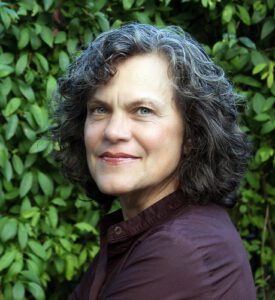De Amerikaanse dichteres Julia Mae Spicher Kasdorf werd geboren op 6 december 1962 in Lewistown, Pennsylvania. Zie ook alle tags voor Julia Kasdorf op dit blog.
They Call It a Strip Job
Stretch of 219 —old road out of West Virginia
they still call the Mason-Dixon Highway—
widens and divides at the Meyersdale bypass,
the right lane closed, drowned by a mound
of inside-out hillside, so I drift to the left, now
running both ways, as the scent of mud floods
in through the vents. All my growing up among
men who skinned hills to scrape their seams,
I’ve never seen a strip job this deep or trucks this big.
No one works the job tonight, which stays light
long after moonrise, no one hears me cuss.
Remember Strypeeze, the goop Mom painted onto
antiques, how it burned your skin and buckled varnish?
Ever feel how hot wax, stroked on the bone beneath
your brow, stings with the flick of a stylist’s wrist?
Ms. Woitek, turquoise eyelids and coral lips, danced
on stage at the Silver Dollar out on Route 30,
everyone said, but who had seen? Her specialty:
one semester of creative writing for eleventh graders.
She’s gone by now. 0, kt her rest on a green hill
somewhere. Let the light hold until I make it home
front a job where I sat in a clean, quiet room
in a brick hall built during the century that built
railroads to haul coal from these hills and logs
from those mountains to prop open deep mines
or to make the ties that held the rails that became
ways to walk our of those towns. 0. how did I come
to get paid to sit in a clean, quiet room and listen
to lines written by coal mined grandchildren, listen
until we find the spots that smolder or sing.
Mennonites
We keep our quilts in closets and do not dance.
We hoe thistles along fence rows for fear
we may not be perfect as our Heavenly Father.
We clean up his disasters. No one has to
call; we just show up in the wake of tornadoes
with hammers, after floods with buckets.
Like Jesus, the servant, we wash each other’s feet
twice a year and eat the Lord’s Supper,
afraid of sins hidden so deep in our organs
they could damn us unawares,
swallowing this bread, his body, this juice.
Growing up, we love the engravings in Martyrs Mirror:
men drowned like cats in burlap sacks,
the Catholic inquisitors,
the woman who handed a pear to her son,
her tongue screwed to the roof of her mouth
to keep her from singing hymns while she burned.
We love Catherine the Great and the rich tracts
she gave us in the Ukraine, bright green winter wheat,
the Cossacks who torched it, and Stalin,
who starved our cousins while wheat rotted
in granaries. We must love our enemies.
We must forgive as our sins are forgiven,
our great-uncle tells us, showing the chain
and ball in a cage whittled from one block of wood
while he was in prison for refusing to shoulder
a gun. He shows the clipping from 1916:
Mennonites are German milksops, too yellow to fight.
We love those Nazi soldiers who, like Moses,
led the last cattle cars rocking out of the Ukraine,
crammed with our parents—children then—
learning the names of Kansas, Saskatchewan, Paraguay.
This is why we cannot leave the beliefs
or what else would we be? why we eat
’til we’re drunk on shoofly and moon pies and borscht.
We do not drink; we sing. Unaccompanied on Sundays,
those hymns in four parts, our voices lift with such force
that we lift, as chaff lifts toward God.
Soms is het makkelijk om te weten wat ik wil
Op een weg die door het rijkste, niet-geïrrigeerde land
van de natie loopt, remde, volgens sommige inwoners van Lancaster, PA,
een minibusje af en riep een vrouw met een goed kapsel:
Wil je een lift of loop je omdat je dat wilt?
Ik antwoordde niet omdat mijn leven zo mislukt voelde—
ongeacht de reden, je krijgt dit of je krijgt het niet—
mislukt op een manier die gebaren van tederheid
verwoestend maakt, zoals de keer dat ik in Minnesota aankwam, broos
van verdriet, en de professor die gestuurd was om me op te halen
vroeg of ik verwarming wilde in de stoel van zijn sportwagen
of de lokale appel die hij had meegebracht voor het geval ik hongerig aankwam.
Ik wist niet dat mensen stoelen maken om een lichaam stralend
te houden als de genadige hand van God. De appel was knapperig en koud
en zoet. Misschien heb ik hem in de ogen gekeken en hem de hand geschud
met allebei mijn handen toen ik wegging, ik weet het niet meer. Maanden later,
stuurde hij een leeg zaadpakket, opengescheurd, gelithografeerd
met een dikke, gele eenjarige die niemand meer kweekt, flamboyant
als glaswerk uit de depressietijd. Dat was alles, dank u.
Dank u, oh, hartelijk dank, heb ik uiteindelijk tegen de vrouw gezegd
omlijst door het raam van een minibusje, maar inderdaad , ik wil liever lopen.
Vertaald door Frans Roumen

Julia Kasdorf (Lewistown, 6 december 1962)
Zie voor nog meer schrijvers van de 6e december ook mijn blog van 6 december 2023 en ook mijn blog van 6 december 2018 en ook mijn blog van 6 december 2017
